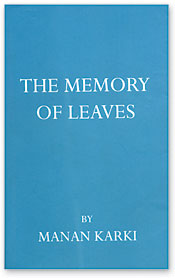 |
'Nepalis writing in English' are a relatively new vista in Nepal's literary landscape. Some significant works have been published in recent years, but it is still thrilling to read a work situated in a familiar context. Manan Karki's The Memory of Leaves is an evocative first novel that makes its mark on the scene with impressive ambitiousness, yet ultimately proves frustrating.
The book is written in three parts, intriguingly titled 'Watson', 'Sherlock' and 'Agnivesh', three first-person narratives that pivot around a central, tragic event. The first section skirts around the story deftly, revealing it in bits and pieces. The narrator, Watson, is a dying and embittered man and his voice is alternately melodramatic and moving. This wavering, almost embarrassed tone fits the character well as he meditates on his life. The passages meander between the present, when Watson is literally preparing for death, and the past, when he recalls the tragic death of his young daughter and its aftermath.
Karki is sometimes long-winded and one longs for conciseness at times, but there are some quite beautiful passages here. In the beginning, Watson is self-consciously literary. Yet when the end nears, the fa?ade drops away and a more genuine, and genuinely sad, self emerges. Here is a man on the brink of death, looking back on his waste of a life, and the painstaking manner in which he details the destruction of all his relationships is poignant.
Unfortunately, the rest of the novel falls short of this initial promise. 'Sherlock' and 'Agnivesh' seem hastily written and their protagonists are not well fleshed out. Sherlock is Watson's childhood friend and you expect some insight into the latter's tragedy, but it isn't forthcoming. His role is significant, yet the way the author sketches it out makes him seem strangely peripheral.
Further, and rather absurdly, Sherlock is an ex-policeman who is apparently wealthy enough to have retired by the age of 45 to throw money at a personal project, a private detective agency with almost no clients. This is explained away by the mention of family money, which Karki might get away with had he not already used that ploy to explain away Watson's lack of employment in the first section. It seems as if the author cannot be bothered to deal with the logistics of normal lives, so he makes the major characters impossibly rich to grant them the leisure to stroll around Kathmandu ruminating on their lives. It's not as though a good narrative is obliged to incorporate the mundane details of what we recognise as normal lives. Karki has some keen observations rendered in imaginative metaphors and lovely turns of phrases, but lyrical language fails to move when it lacks context and is not rooted in a plausible reality.
Agnivesh's narrative, too, proves half-hearted and fails to tie the story together. We have here a very angry young man whose dead sister seems to mean very little to him. The author shows us how destructive the tragedy has been to Agnivesh's life, but he comes off as one-dimensional. That Karki pays far too little attention to character development is seen even more starkly in his treatment of Watson's wife Madhu, who has been a 'vegetable' since the death of their daughter. One of the central problems of the novel is that Madhu never comes to life, in the past or the present. Karki does not bother to give Madhu any kind of voice or inner life, and her being in a vegetative state seems merely a convenient device. He makes her an apparition floating around with nothing to do or say, and does a great disservice to a potentially powerful story.
The Memory of Leaves is disappointing precisely because it has so much ambition and potential to begin with. You can forgive the author slight self-indulgence in his prose, because he writes so beautifully. But one cannot help feeling let down by the way he abandons his story after raising so many expectations.
The Memory of Leaves is published by Pillar Press (Ireland) and may be downloaded at http://sites.google.com/site/memleaves/ (contribution optional)


